Design
LE LAMPADE “BRANCUSI”
UN SISTEMA DI LUCE MOBILE E MODULABILE

La magia della luce mobile, declinata in molte versioni.
La lampade Brancusi costituiscono una famiglia di lampade e un progetto di luce, entrambi nati da una fascinazione estetica e concettuale: le carrucole usate da Constantin Brâncuşi nel suo atelier parigino.
Semplici aste, pesi, contrappesi, meccanismi, carrucole e cavi per supportare una fonte luminosa che può essere diretta su una scultura preziosa o su un oggetto di uso comune, oppure semplicemente nel vuoto di una stanza.
La luce come strumento di lavoro per plasmare lo spazio.
Una luce mobile, modulabile, trasformabile, adattabile alle esigenze e al mutare delle necessità. Quando è accesa la lampada scompare, resta solo la luce e la sua magia.
The magic of a movable light, declined in many versions.
“Brancusi” is a family of lamps and a lighting project, born from an aesthetical fascination from the pulleys that Constantin Brâncuşi’s used in his Parisian Atelier.
Simple bars, weights, counterweights, mechanisms, pulleys and cables used to hang a lighting source, that can be pointed on a precious sculpture or onto a common object, or simply in the empty space of a room.
It’s a movable light, modular, transformable, adaptable to different and changing needs.
When it’s on the lamp disappear, it’s nothing but light and its magic.
“BRANCUSI LAMPS”
Sistema di apparecchi luminosi mobili, di diverse lunghezze e con diverse elettrificazioni e misure
Fonte luminosa: varie
Produzione: AUTOPRODUZIONE IN SERIE LIMITATE
American Academy in Rome, Galleria Antonia Jannone Disegni di Architettura
Inizio progetto: 2011 – in corso
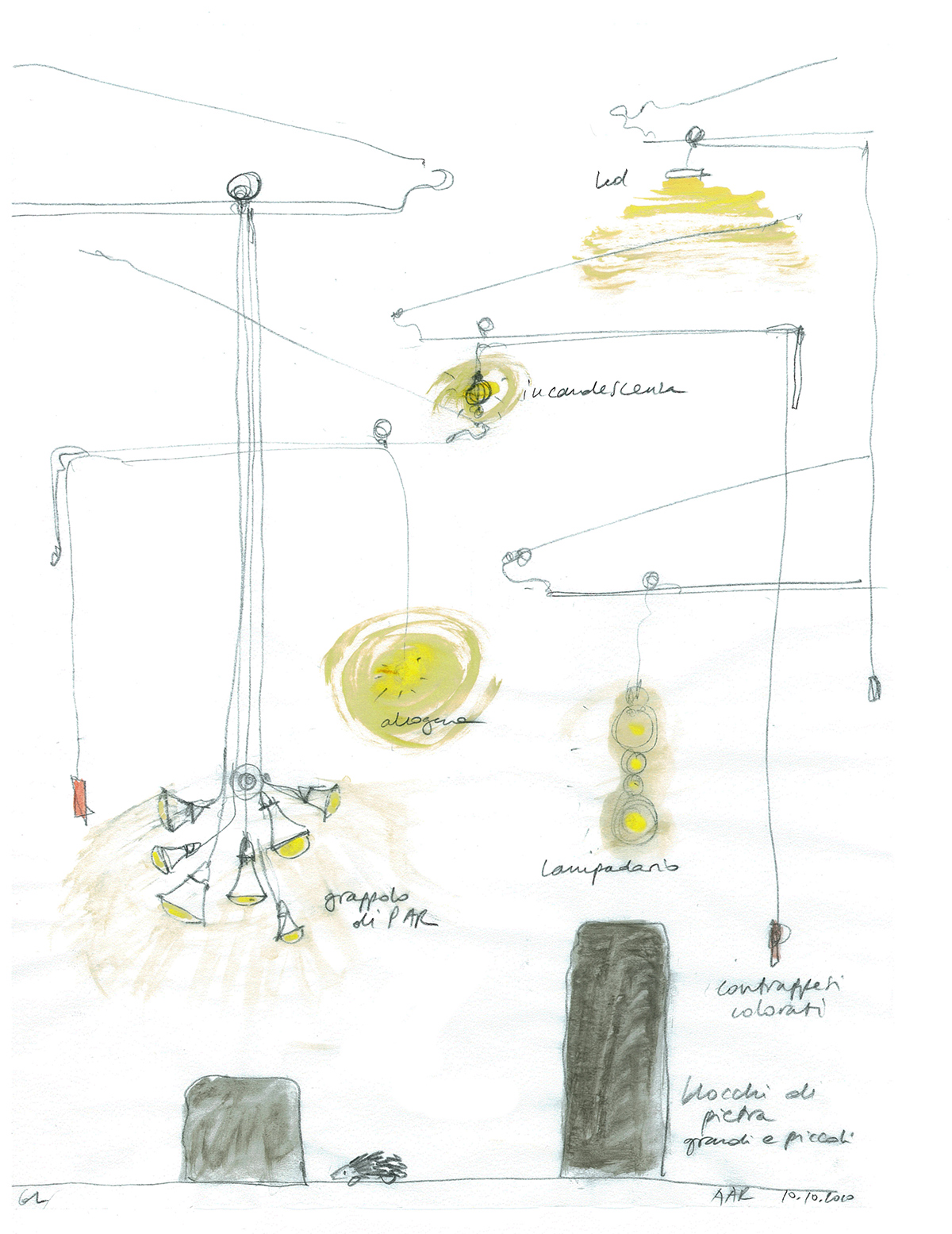
Le BRANCUSI BRONZO sono state progettate per la Galleria Jannone di Milano con una particolare attenzione ai dettagli e ai materiali: a partire dai primi modelli più semplici ed essenziali, in questa versione ogni dettaglio è stato impreziosito, così come la scomponibilità dei pezzi e gli incastri tra le componenti.
Realizzate in due lunghezze, con o senza tirante a seconda del peso del paralume e della fonte luminosa, hanno cavo elettrico portante nero o colorato.
The BRANCUSI BRONZE were designed for the Jannone Gallery with particular attention to details and materials: starting from the first simpler and more essential models, in this version every detail has been embellished, as well as the decomposability of the pieces and the joints between the components.
Made in two lengths, with or without tie rod depending on the weight of the lampshade and the light source, they have a black or colored electric cable.
“BRANCUSI BRONZO”
Lampada ad asta corta o lunga, a cavo portante, con accessori in bronzo e paralume in rame tornito
Fonte luminosa: lampadina a led 2700°K
Produzione: AUTOPRODUZIONE IN SERIE LIMITATE
Galleria Antonia Jannone Disegni di Architettura
2019
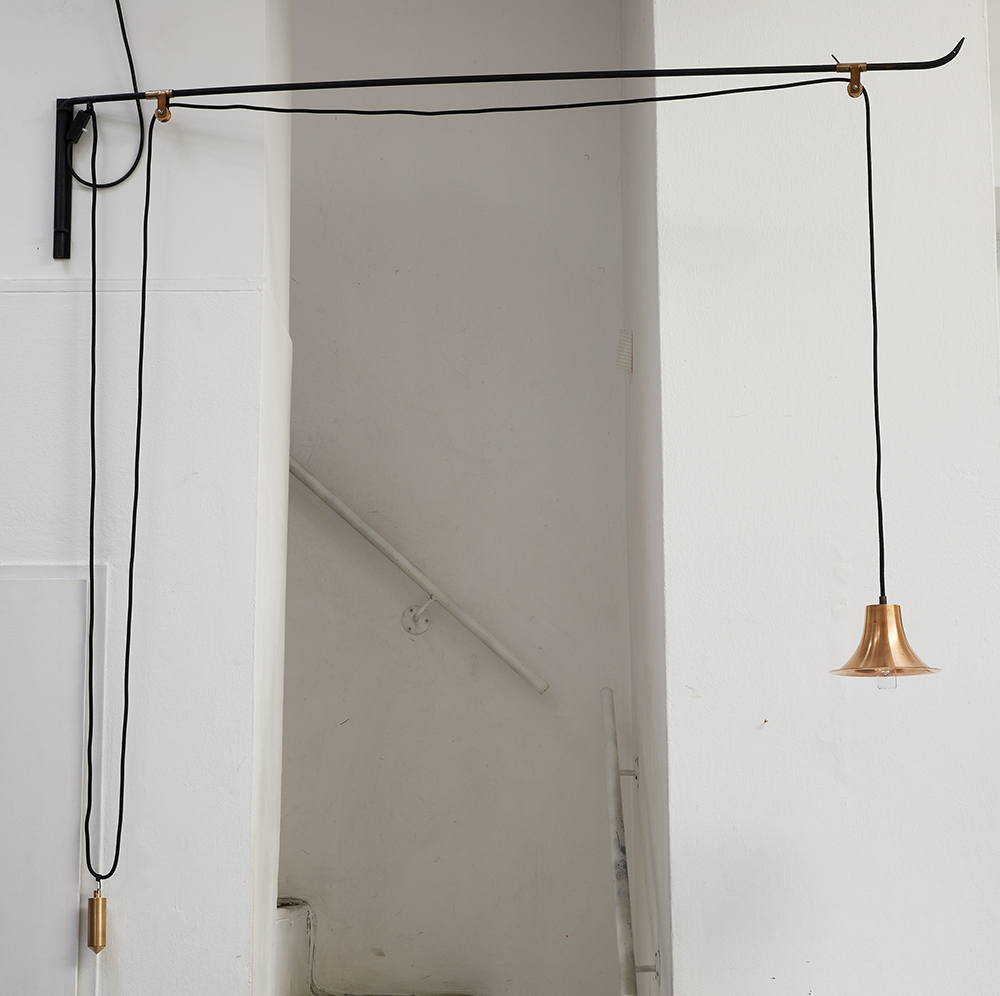
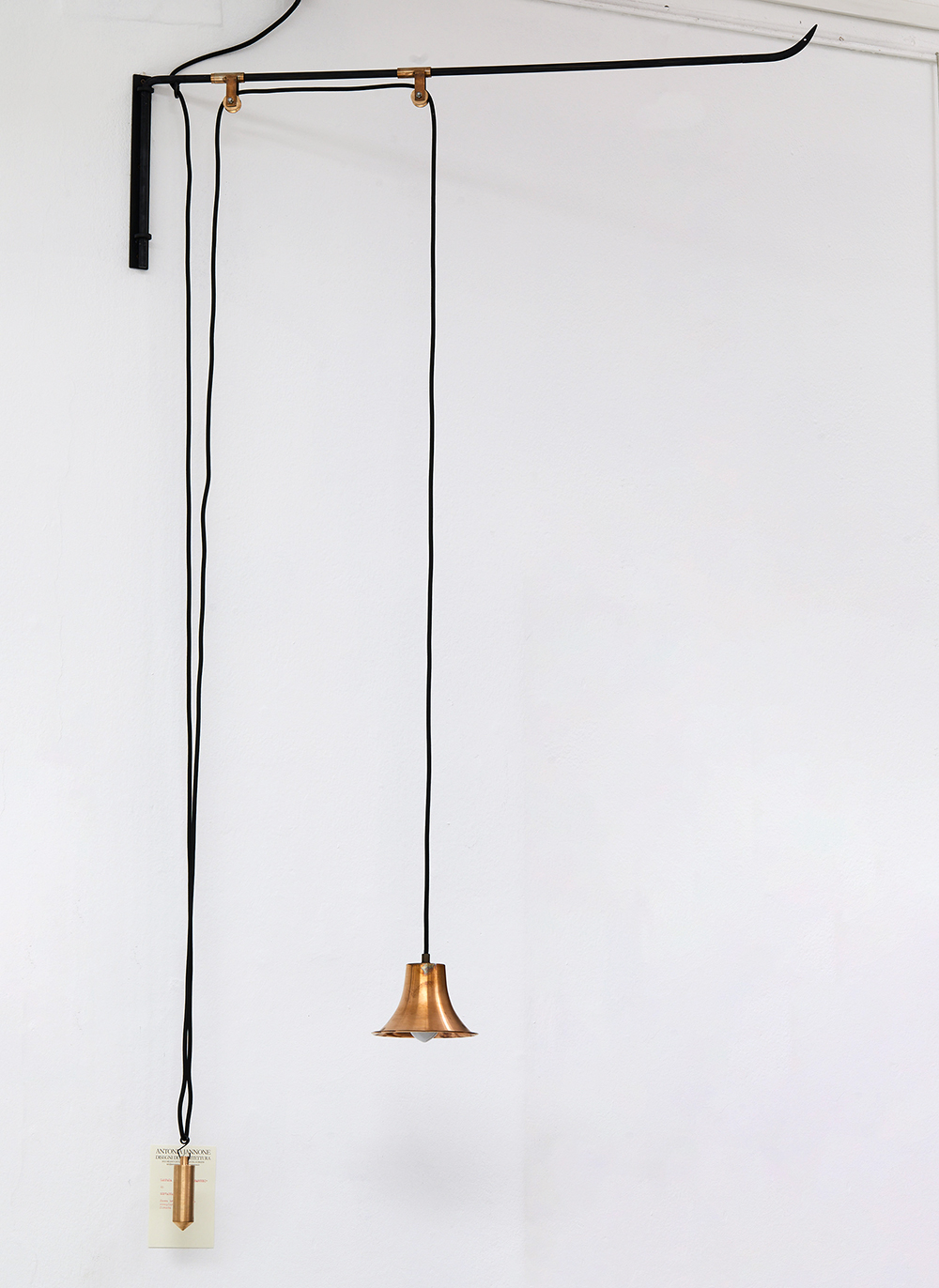
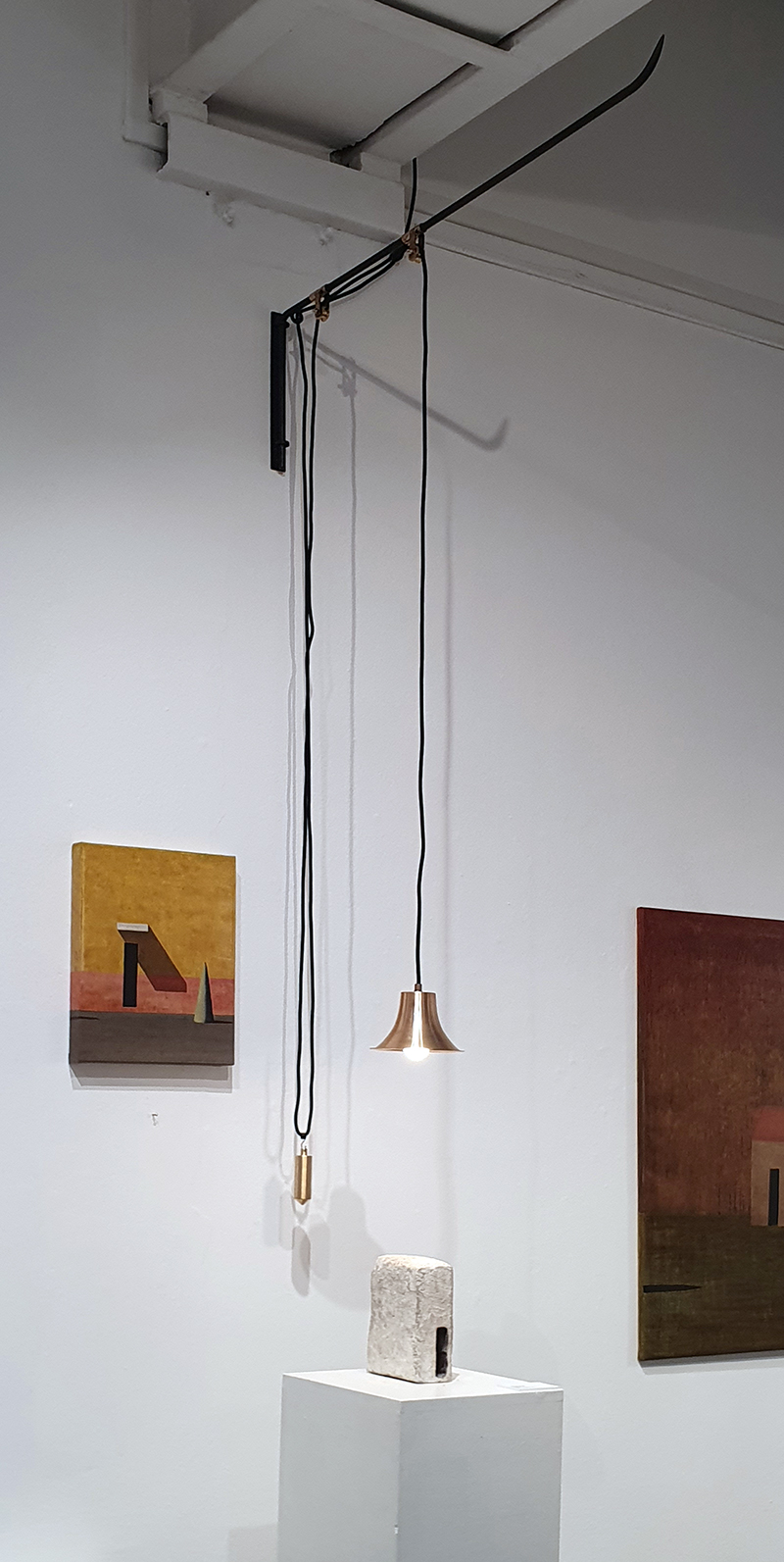



Nella Galleria Antonia Jannone di Milano le Brancusi sono sospese in alto, pezzi artistici ad illuminare altri pezzi artistici
In the Galleria Antonia Jannone in Milan, the Brancusi are suspended high up, artistic pieces to illuminate other artistic pieces
La lampada BRANCUSI MINI è l’apparecchio più semplice della serie: composto da una semplice asta piegata in acciaio armonico, supporta la lampadina nuda grazie al cavo elettrico portante e al sistema di carrucole.
L’assenza di paralume rende stilisticamente essenziale il pezzo, unitamente al contrappeso ready made.
The BRANCUSI MINI lamp is the simplest fixture in the series: made up of a simple bent rod in harmonic steel, it supports the bare bulb thanks to the supporting electric cable and the pulley system.
The absence of a lampshade makes the piece stylistically essential, together with the ready-made counterweight.
“BRANCUSI MINI”
Lampada ad asta corta a cavo portante, senza paralume, accessori ready made
Fonte luminosa: lampadina circolare a led, 3000°K
Produzione: AUTOPRODUZIONE IN SERIE LIMITATE
Galleria Antonia Jannone Disegni di Architettura, Milano
2014
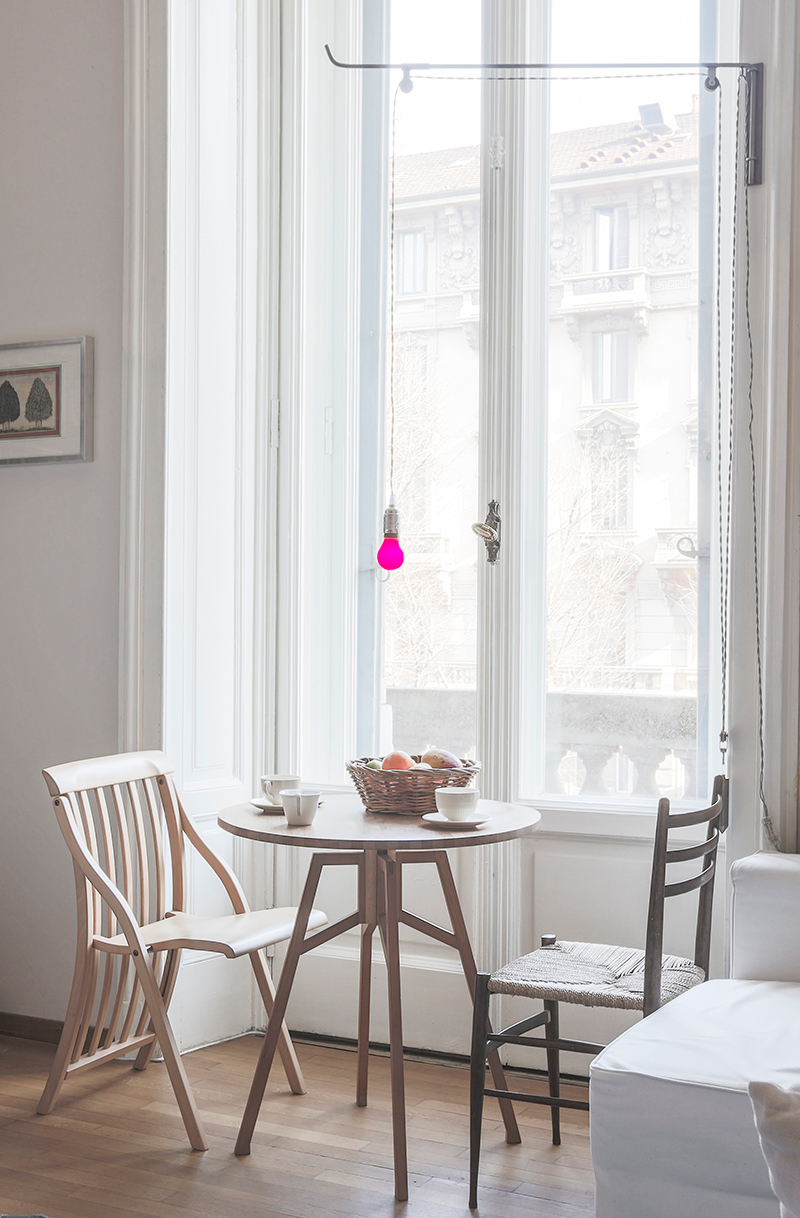
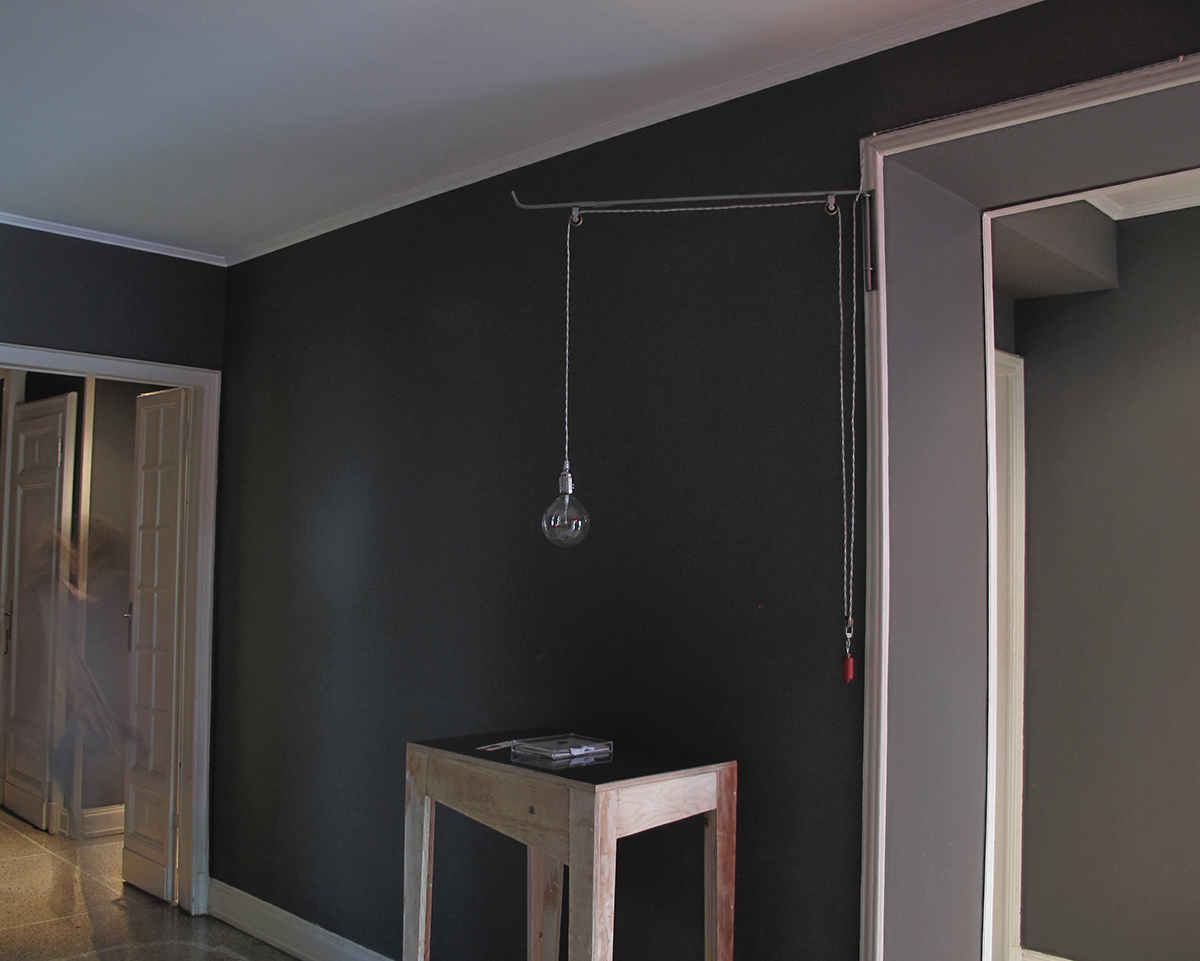
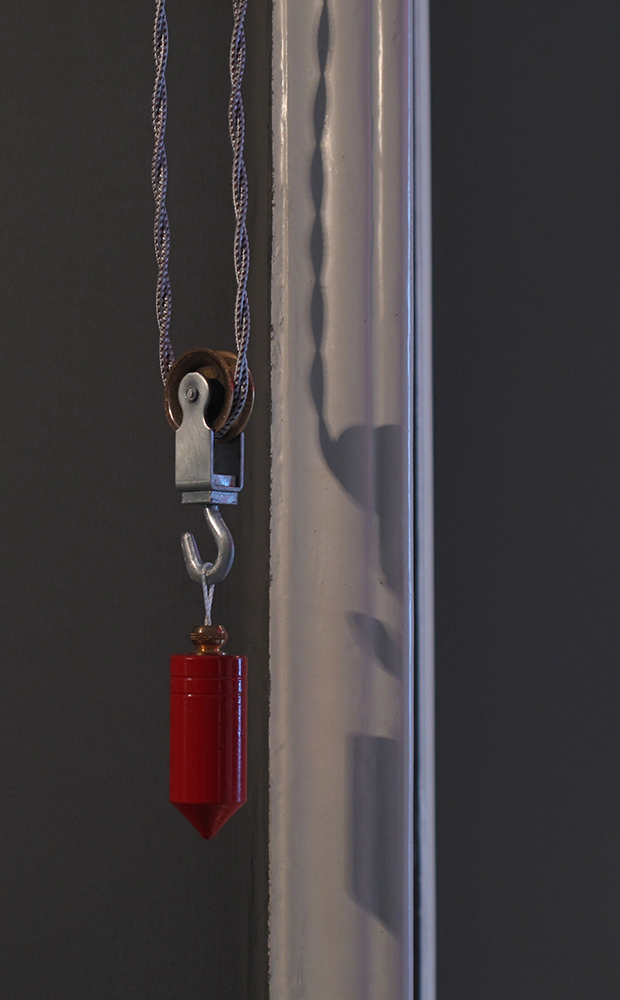

La BRANCUSI 2 è l’eveluzione della Brancusi One, ed è pensata come un oggetto aereo grazie al sistema di contrappesi che libera il cavo elettrico dalla funzione portante.
La fonte luminosa galleggia nello spazio, e il contrappeso è un oggetto decorativo che decora la parete su cui insiste.
Può essere a braccio singolo o a due bracci, gestibili indipendentemente ma fissati ad un’unica basetta a parete.
The BRANCUSI 2 is the evolution of the Brancusi One, and is designed as an aerial object thanks to the counterweight system which frees the electric cable from its carrying function.
The light source floats in space, and the counterweight is a decorative object that decorates the wall on which it rests.
It can have a single arm or two arms, which can be managed independently but fixed to a single wall base.
“BRANCUSI 2” SINGOLA E DOPPIA§
Lampada ad asta lunga a cavo libero con tirante, senza paralume
Fonte luminosa: spot led / Par led, 3000°K
Produzione: AUTOPRODUZIONE IN SERIE LIMITATE
ph. Marco Beck Peccoz
2012
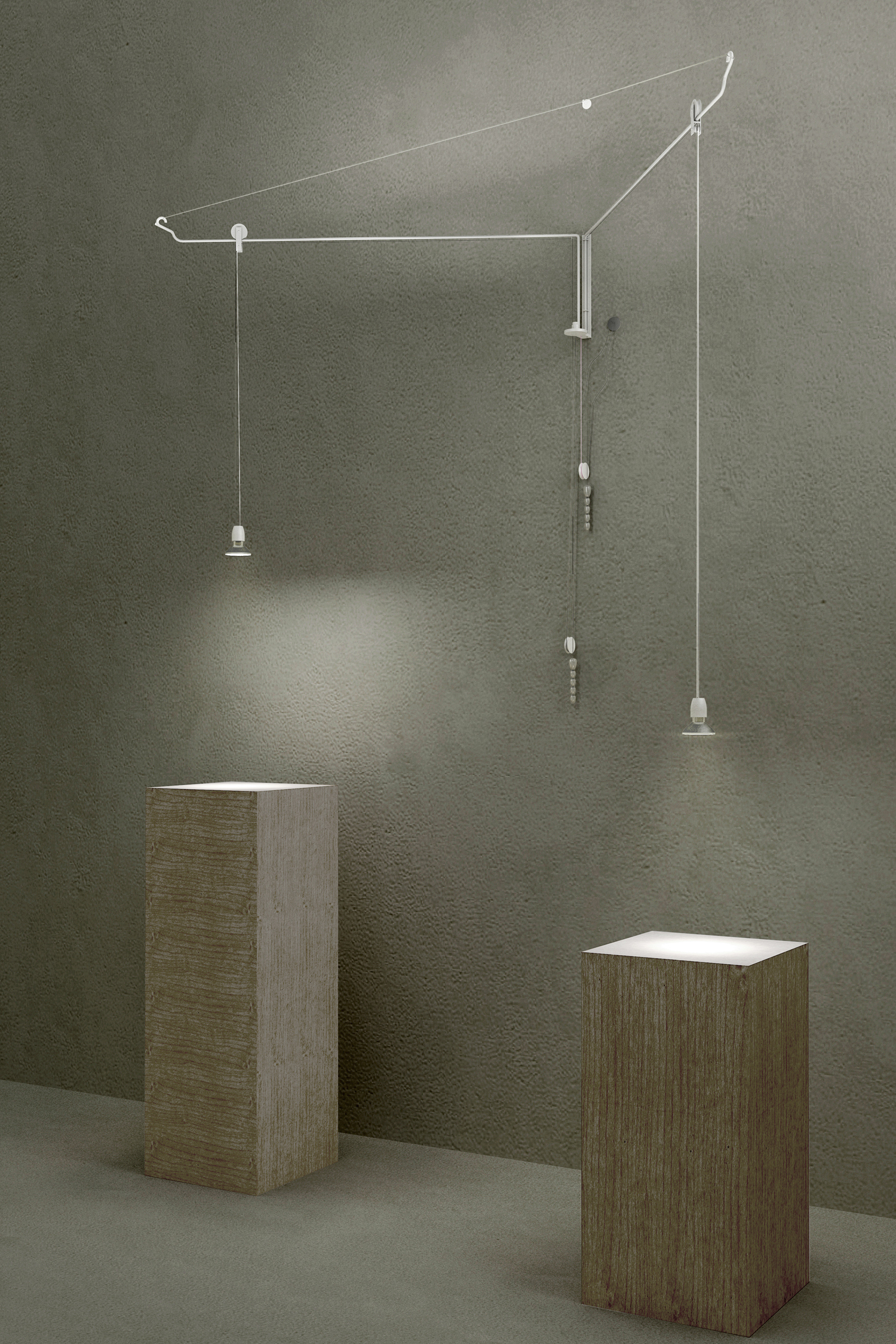
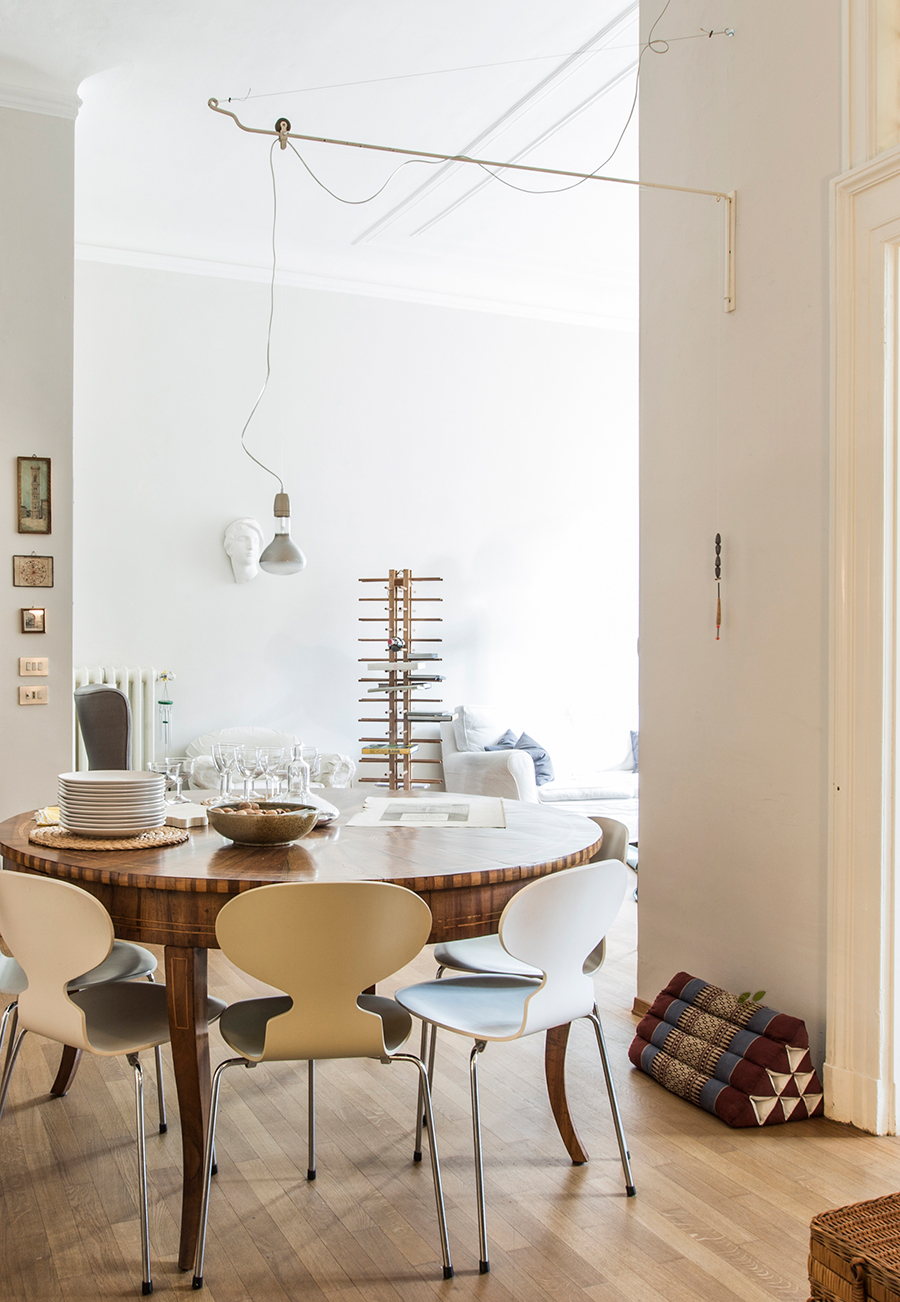

BRANCUSI ONE è il primo pezzo studiato durante una residenza d’artista presso l’American Academy in Rome nel 2011.
Brancusi One racchiude la fascinazione delle carrucole di Brancusi il cui uso è qui traslato sulla luce, per renderla lo strumento di trasformazione dello spazio.
Le componenti sono semplici e matericamente grezze: l’asta di ferro curvato e cerato; il contrappeso scolpito in ferro pieno; il cavo elettrico in tessuto; le carrucole saldate; la lampada Par a spot, focalizzata sull’opera da illuminare.
Nella installazione nell’atrio di ingresso dell’American Academy in Rome era puntata su un busto romano, ad enfatizzarne le forme grazie ad un gioco di ombre e chiari scuri.
BRANCUSI ONE is the first piece studied during an artist residency at the American Academy in Rome in 2011.
Brancusi One embodies the fascination of Brancusi’s pulleys, the use of which is here translated into light, to make it the tool for transforming space.
The components are simple and materially rough: the curved and waxed iron rod; the counterweight carved in solid iron; the electric cable in fabric; welded pulleys; the Par spot lamp, focused on the work to be illuminated.
In the installation in the entrance hall of the American Academy in Rome it was focused on a Roman bust, to emphasize its shapes thanks to a play of shadows and chiaroscuro.
“BRANCUSI ONE”
Lampada ad asta lunga e cavo portante, senza paralume
Fonte luminosa: lampadina PAR led, 3000°K
Produzione: AUTOPRODUZIONE IN SERIE LIMITATE
ph. Gio Latis
2011
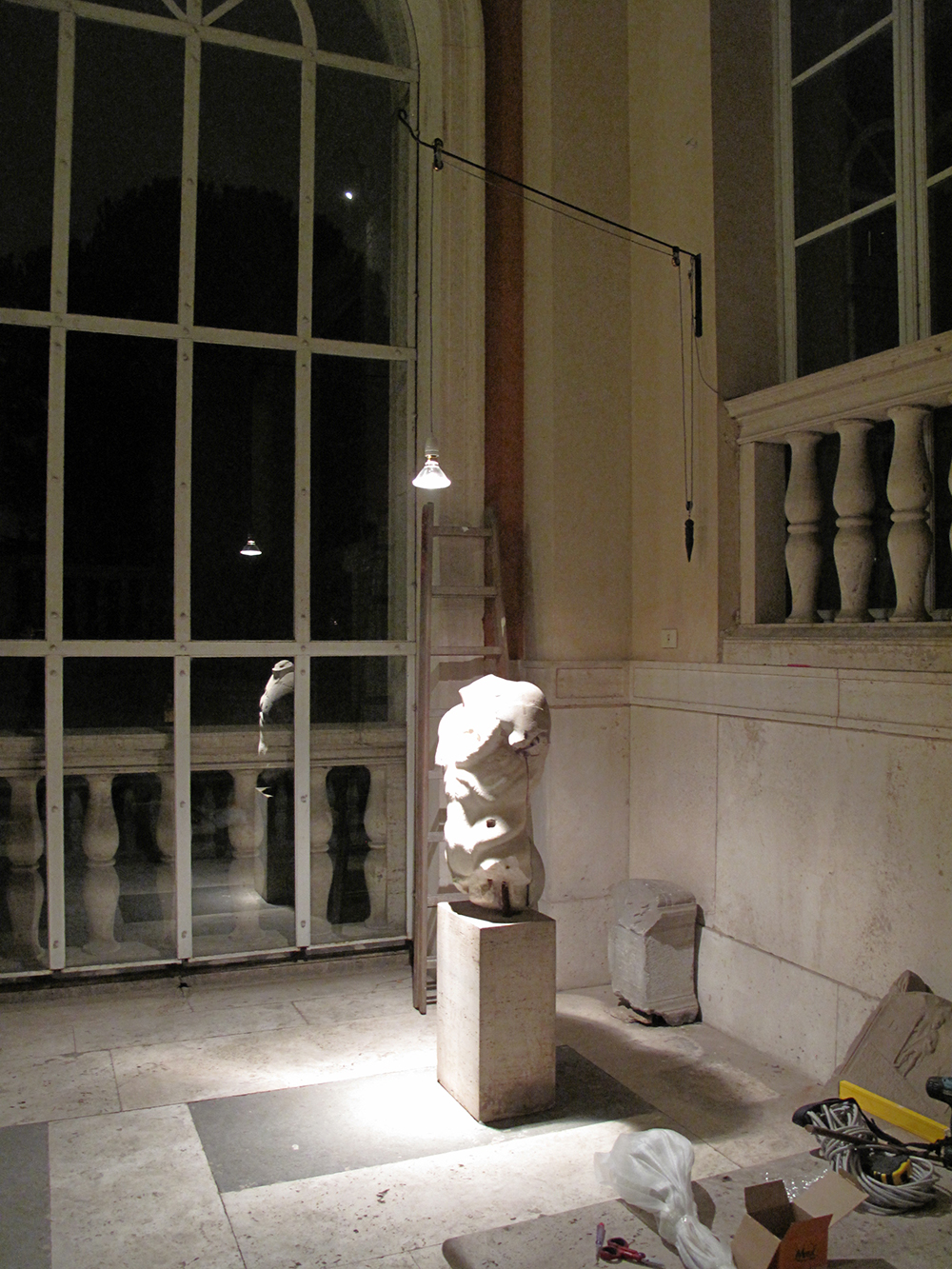
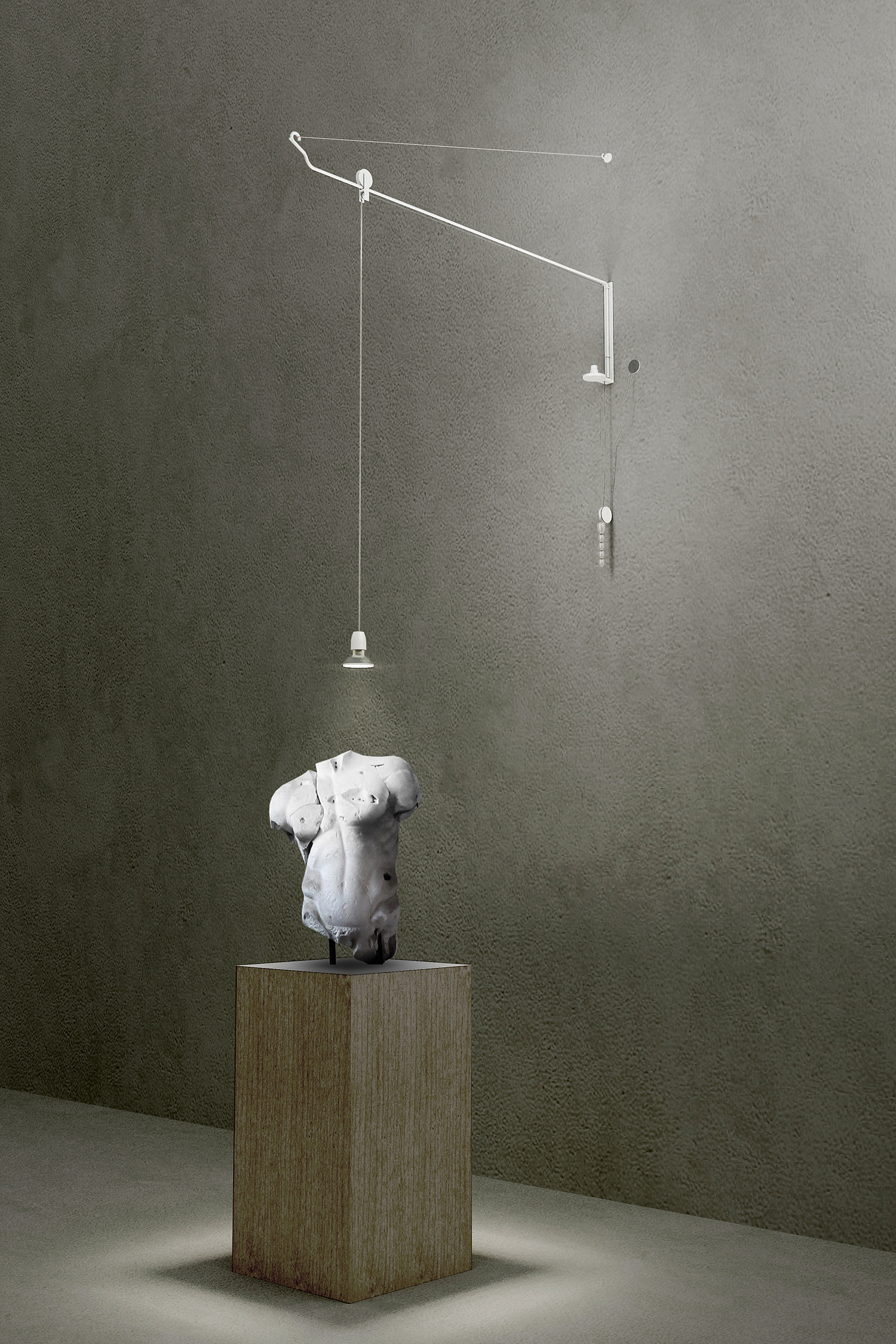
TESTI CRITICI
CRITICAL TEXT
La luce è fatta di energia e niente di più
Michele De Lucchi, 2015
La luce è fatta di energia e niente di più.
Non si deve aggiungere niente di superfluo.
Si può in caso rendere più disponibile, più facile da usare, più adattabile alle esigenze. Ma sempre a condizione di non aggiungere inutili ingombri.
Si può aggiungere movimento, certamente. Anzi. Il movimento esalta la qualità della luce e una lampada è luce in movimento.
Le lampade Brancusi di Giovanna Latis sono questo. Movimento. Di leve e morsetti, di tiranti e braccia aggettanti, di pulegge e carrucole, di pesi e contrappesi.
È un mobile provocatoriamente fissato non al soffitto ma alla parete.
Sfrutta semplici e intuitivi cinematismi per rendere disponibile nello spazio una fonte luminosa. Sopra un tavolo, un letto, un divano, una libreria, un angolo buio.
Brancusi fa spazio perché è un oggetto che occupa l’aria e la rende plastica, pratica e festosa, un po’ come un utensile e un po’ come un giocattolo.
Appendere nell’aria è un esercizio espressivo che scolpisce il vuoto e lo rende fisico, solido.
Se poi le parti appese sanno rappresentare il cielo e la terra, quello che vola e quello che pesa, allora la lampadina è il sole e il contrappeso un banco di sardine.
Il sole però non è solo una sorgente di luce, è anche una stella che vaga con la sua orbita negli spazi dell’universo. Noi non sappiamo come è fatta questa orbita, come si configurano gli spazi curvi che Einstein ha teorizzato. Forse lo sanno gli astrofisici e forse esiste sulla terra qualche mente geniale capace di figurarselo.
Noi al massimo c’è lo possiamo immaginare come un groviglio di spirali che nascono da un’unica superficie piana e modellano lo spazio con le loro sinuosità.
Light is made of energy, nothing more
Michele De Lucchi – 2015
No extras should be added.
Eventually, our contribute could be to make it easily available and more adaptable to different needs.
Without adding useless encumbrance. You can make it moveable, and that’s good.
Movement enhances the quality of light and a lamp is light in movement.
The Brancusi Lamps designed by Gio Latis are exactly this: movement.
Movement of levers, clamps, rods, protruding arms, cables and pulleys, weights and counter-weights. These lamps are pieces of furniture provocatively fixed to the walls, not to the ceiling. The designer uses simple and intuitive kinematics to make a light source available in the space, so that you can have it on a table, a bed, a sofa, a bookshelf, a dark corner.
Brancusi lamps create the space, they are objects that occupy air and make it plastic, practical and festive: as a tool, as a toy.
Hanging something in the air is an expressive exercise that sculpts the void and makes it physical, solid.
If the hanging parts represent sky and earth, what is light and capable to fly and what is heavy, then the bulb seems to be the sun and the counterweight a school of sardines.
Sun is not only a light source, it is also a star wandering in the universe with its orbit.
Nobody knows how this orbit is, how these curved spaces that Einstein theorized are.
Maybe the astrophysicists know, or perhaps some genial mind is able to figure it.
We can only imagine it as a spiral tangle growing up from a plane surface, modeling the space with its sinuosity.
Gio Latis, macchinista luminosa
Matteo Pirola – 2012
Gio Latis è una designer, che non dimentica il linguaggio proprio dell’architettura. Sente nascere i progetti da dentro e attraverso una ricerca discreta ma determinata, sperimenta, prova e riprova fino a chiarirsi le idee, che diventano progetto. Fare per capire, e poi scegliere, lasciando la possibilità a chi ne gode di costruirsi una sua storia, con personaggi e paesaggi definiti. Prende spunto da cose casuali e da ambienti culturali anche sfuocati, si prende cura delle eccezioni e le fa diventare regola, si accorge di cose minime e le fa diventare degne di nota.
Così ha fatto con il sistema “Brancusi”, omaggio al grande scultore, ma soprattutto al suo atelier e al suo lavoro, dove il disordine apparente trovava un ordine funzionale grazie agli speciali strumenti che aveva ideato: meccanismi a sbalzo, orientabili, leggiadri ed efficaci, sorreggevano strumenti di lavoro e materia per alleggerire le azioni, e per togliere quel senso di gravità alla scultura.
Come Constanin Brancusi sospendeva i suoi strumenti da lavoro, Gio Latis sospende lo “strumento” per creare un ambiente: la luce.
“Brancusi” è una famiglia di lampade ed è un modo di illuminare, sono tanti oggetti in uno, che determinano una specie di sistema solare d’interni, fatto di stelle elettriche. Non un semplice impianto di illuminazione, ma un progetto di luce, fatto certo di aste, carrucole, contrappesi, cavi, lampade ready-made, ma soprattutto di movimento che gioca con la complessità dello spazio. La lampadina si muove e produce luci diverse, vicine e lontane, radenti, puntuali o diffuse… e fa ombre, che disegnano lo spazio.
Gio Latis, luminous engine driver
Matteo Pirola – 2012
Gio Latis is a designer who does not forget the language of architecture. He feels the projects being born from within and through discreet but determined research, she experiments, tries and tries again until her ideas become clear, become a project. Doing for understanding, and then choose, by leaving the opportunity for those who enjoy it to build their own story, with defined characters and landscapes. She takes its cue from random things and even fuzzy cultural environments, she takes care of the exceptions and makes them the rule, it notices minimal things and makes them noteworthy.
This is what she did with the “Brancusi” system, a tribute to the great sculptor, but above all to his atelier and his work, where apparent disorder found functional order thanks to special tools he had devised: cantilever, adjustable, graceful and effective mechanisms , supported work tools and material to lighten the actions, and to remove the sense of gravity from the sculpture.
As Constanin Brancusi suspended his work tools, Gio Latis suspends the “tool” to create an environment: light.
“Brancusi” is a family of lamps and it is a way of lighting, they are many objects in one, which determine a sort of internal solar system, made up of electric stars.
Not a simple lighting system, but a lighting project, certainly made up of rods, pulleys, counterweights, cables, ready-made lamps, but above all of movement that plays with the complexity of the space.
The light bulb moves and produces different lights, near and far, grazing, punctual or diffused… and creates shadows that design the space.

